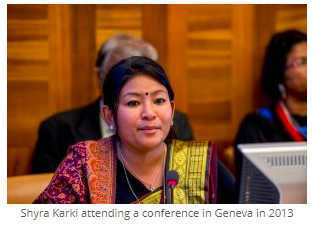Analysis
LGBTI Rights in Nepal: Progress, but Not Perfect
2016-08-19

On the surface, Nepal is one of the most progressive Asian countries in its treatment of lesbian, gay, bisexual, transgender, and intersexual (LGBTI) rights. In September 2015, Nepal became the first Asian nation to include anti-discrimination laws to protect the LGBTI community against abuse, violence, and discrimination. Nepal is also one of the first countries in the world to issue third-gender passports for individuals who identify neither as male or female, which was a huge victory for the transgender community in Nepal.
However, it has been a hard road for the LGBTI community to achieve this progress. There are very few openly gay individuals in government and politics, and instances of past violence and discrimination towards LGBTI persons are unfathomable. In 2004, a police officer forced a transgender woman to perform oral sex on him, and then brutally murdered her. Transgender women in Nepal, known as metis, have been the subject of police and community brutality, as well as other members of the LGBTI community.
Despite the laws in place to protect them, as well as the decrease of outright violence, LGBTI individuals still face hurdles in education, housing, and employment. LGBTI students frequently drop out of school due to bullying and harassment, which leaves them vulnerable due to a lower level of education than their heterosexual peers. Others face discrimination in housing and employment if the landlords or employers are opposed to their sexual orientation and/or identity, and may be charged higher rent rates, or simply not accepted as tenants. Family acceptance is not always given, as being lesbian, gay, or transgender is considered a rejection of normal gender roles, which leaves members of the LGBTI community with even less support. Additionally, in Nepal’s new constitution, the right of same-sex marriage was not addressed, leaving LGBTI persons without the ability to legally marry.
At the forefront of the fight for LGBTI rights are Nepal’s human rights defenders and civil society organizations. This month, we wish to highlight Shyra Karki, a young woman human rights defender who has taken a stand to promote LGBTI rights and defend individuals who have become the subject of discrimination and abuse. Shyra previously worked as an advocate with Mitini Nepal, and is now a board member of the National Alliance of Women Human Rights Defenders where she represents the sexual and gender minorities’ movement. In 2012, she worked on behalf a lesbian couple that was being effectively separated by family members as well as local NGOs. The case went up to the Supreme Court who ruled in favor of the couple, stating that individuals must be permitted to live with whom they choose.
Most recently, Shyra has worked with an at-risk lesbian couple from another SAARC country who fled to Nepal. However, the couple is still in need for third country relocation as Nepal lacks sufficient provisions for refugees other than Bhutanese.
Shyra works to build her own capacity as a WHRD by keeping herself knowledgeable and up to date on current LGBTI issues. The National Alliance of WHRDs organizes trainings on human rights and protection issues that she attends. Shyra has also traveled to Geneva to present on LGBTI issues in Nepal, as well as Ireland to attend the Front Line Defender Conference. Her family is very supportive of her work, which helps her endure the challenges she sometimes faces as a WHRD, which have included threats from families of those she advocates for and even character shaming from government officials.
While WHRDs like Shyra and CSOs like the Blue Diamond Society have helped pave the way for enhanced awareness and improved rights for LGBTI individuals, there is still work to be done in Nepal to ensure a safe environment where individuals can live freely without fear of discrimination and abuse. The Nepalese government should encourage the participation of LGBTI persons in government and political roles in the country to help them play a more active role in policy and law formation to upwardly mobilize this community that has faced historic abuse. Unfortunately, until a shift in societal mindset occurs towards the LGBTI community, rejection from family members will continue to prevail, and that might be the worst discrimination an LGBTI person faces, not just in Nepal, but also in every country.

